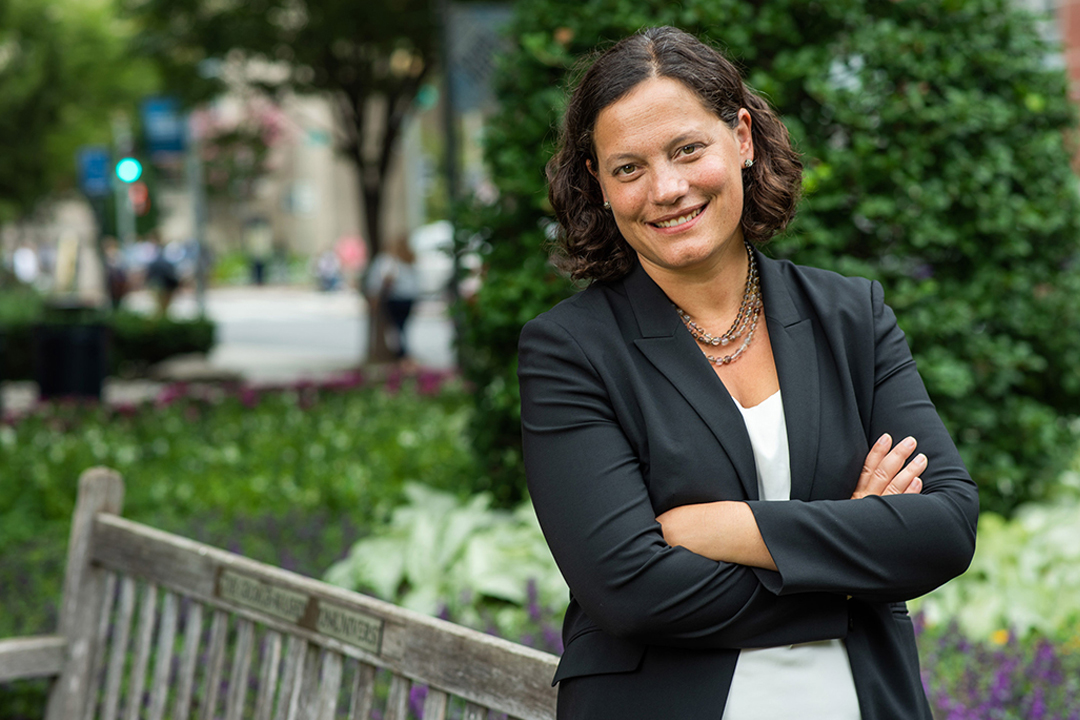Kate Weisburd has joined GW Law's faculty as an Associate Professor of Law teaching Criminal Law to 1Ls in the fall and Criminal Procedure in the spring. Professor Weisburd's primary interests are in the areas of criminal investigation, adjudication, and post-conviction law as they relate to the street-level implementation of criminal justice reform. GW Law recently caught up with Professor Weisburd about her move to D.C., her research and scholarship, and more.
Professor Weisburd shared that she was attracted to the law school because of the "incredible civic-minded community of faculty and students." She said, "I'm inspired by the intellectual curiosity of the students. And I am very much humbled and thrilled to be joining a faculty known for both innovative and influential research, as well as world-class teaching." At the research level, Professor Weisburd, whose focus is in criminal justice reform, said D.C. offers the "perfect vantage point" to study the street-level implementation of criminal justice reform efforts. Whether it's congressional hearings or protests in front of the White House, she calls D.C. "ground-zero for policy reform efforts."
Prior to joining GW Law, Professor Weisburd defended young people and adults in criminal court. She founded and directed the Youth Defender Clinic at the East Bay Community Law Center, which is part of the clinical program at UC Berkeley School of Law and the largest provider of free legal services in the county. "I saw how criminal justice reform aimed at advancing the liberty or due process rights of defendants often exacerbated the exact problems they sought to address." In particular, she noticed the ways that surveillance technology was used to monitor people on probation and parole. And while the goals of this "automated" probation were noble—improving community supervision as an alternative to prison—the reality was that probation-by-machine often further ensnared people within the criminal justice system for longer and made it that much harder for them to succeed, Professor Weisburd explained.
"Even in these polarized times, there is a surprising amount of bipartisan support for large-scale criminal justice reform. But what that reform looks like—and how it is implemented at the street-level—is the million-dollar question. And that's the question that intrigues me the most," she said when asked about her enthusiasm for criminal law.
Professor Weisburd revealed that she is looking forward to her research and scholarship because of her interest in community supervision, which, she said, is the most common form of punishment in the United States. "I'm really interested to see how technology-related 'reform' efforts are implemented and whether these efforts frustrate or further the goals of community supervision."
With the help of law students, Professor Weisburd hopes to study a few jurisdictions to better understand the ways that surveillance technology is used in the context of probation and parole. "I'm also really interested in how 'consent' is deployed to justify increasingly invasive and often otherwise unconstitutional privacy intrusions for people on probation and parole. People on probation and parole already have diminished privacy rights—but that’s not the same thing as no privacy rights."
Q&A with Professor Weisburd
What do you enjoy most about teaching students?
Law students see things that those of us who've been practicing or teaching for a while no longer see. They come to law school with a fresh pair of eyes—they ask "why" all the time and for all the right reasons. More than most people, law students are naturally skeptical, and I love that. We should always be questioning why legal institutions operate the way they do. And the combination of skepticism, outrage, puzzlement, amazement, and curiosity make for a really rich class discussion.
What has been a favorite memorable classroom moment for you?
I used to supervise students in a juvenile defense clinic at the East Bay Community Law Center. Our law students worked to get their young clients out of the juvenile court system and back into school. Our students spent weeks getting to know their client, investigating the case, doing legal research, and writing motions. But my favorite moments were watching our students in court—whether they won or lost they always fought so hard. It was truly inspiring.
Tell us one thing we don't know about you that your students may find interesting?
I once swam from Alcatraz Island to San Francisco. Without a wetsuit.


